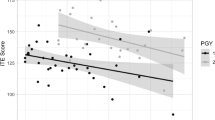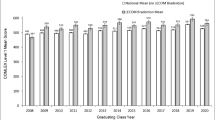Abstract
Introduction
Implementation of the 80-hour work week has resulted in limitations on the hours available for resident education, creating a need for innovative approaches to teach surgical residents successfully. Herein we report the methods and results of an innovative didactic learning program at a large academic surgerical residency program.
Methods
Between 2004 and 2005, based on known principles of adult education and innovative learning techniques, a didactic learning program was instituted in a major academic surgery program. The course work consisted of a structured reading program using Schwartz’s Textbook of Surgery, with weekly testing and problem-based learning (PBL) groups led by surgical faculty. The residents’ progress was assessed by American Board of Surgery In-Training Examination (ABSITE) training scores before and after program implementation. A resident survey was also conduced to assess residents’ attitudes toward the new program. Results were reported as a mean, and categoric variables were compared using a paired Student’s t-test.
Results
During the academic year of the structured reading program, the mean ABSITE score improved by 10% (P = 0.02) from the previous year. The postgraduate year 4 class had the largest change, with a score increase of 17% over the previous year’s performance (P = 0.02). Survey results demonstrated that 64% of the responders agreed that the small-group PBL was preferable for achieving educational goals. Furthermore, 89% of residents responded that the PBL groups improved interaction between residents and faculty members.
Conclusions
An innovative formal learning program based on a major surgical textbook with weekly testing and small group sessions can significantly improve surgical training in the modern era of work-hour restrictions. Furthermore, surgical trainees find this format to be innovative and useful for improving didactic teaching.
Similar content being viewed by others
References
Halstead WS. The training of the surgeon. Johns Hopkins Hosp Bull 1904;15:267–275
Bloom BS. Taxonomy of Educational Objectives: The Classification of Educational Goals. Handbook I, Cognitive Domain. New York, Longmans Green, 1956
Knowles MS. The Modern Practice of Adult Education: From Pedagogy to Andragogy. Englewood Cliffs, Cambridge, 1980
Knowles MS. Self-Directed Learning: A Guide for Lecturers and Teachers. New York, Association Press, 1975
Barrows HS. A taxonomy of problem-based learning methods. Med Educ 1986;20:481–486
Schwartz RW, Donnelly MB, Sloan DA, et al. Residents’ evaluation of a problem-based learning curriculum in a general surgery residency program. Am J Surg 1997;173:338–341
http://www.studygs.net/. Retrieved December 20, 2004
Ostrander S, Schroeder L. Super Learning 2000. New York, Dell, 1997
http://www.simonsays.com/content/feature.cfm?sid=128& feature_id=422/. Retrieved December 20, 2004
http://www.en.wikipedia.org/wiki/Pimsleur_language_learning_system/. Retrieved November 10, 2004
http://www.rosettastone.com/. Retrieved December 20, 2004
Curtis L. How to Turn Stress into Energy with a Seven Minute Stress Breaker. New York, Superlearning, 1989 (tape)
Tomatis A. The Conscious Ear: My Life of Transformation Through Listening. New York, Station Hill Press, 1988
http://www.ancientegypt.co.uk/writing/rosetta.html/.Retriev ed December 20, 2004
Nguyen L, Brandt ML, Awad SS, et al. ACGME core competency. In Brunicardi FC Andersen DK, Billiar TR, et al, editors. Schwartz’s Principles of Surgery, 8th edition. New York, McGraw-Hill, 2004
Awad SS, Hayley B, Fagan SP, Berger DH, Brunicardi FC. The impact of a novel resident leadership training curriculum. Am J Surg 2004;188:481–484
Acknowledgements
The authors specifically thank the faculty who led the initial small-group sessions for making this program successful: Matt Carrick, MD, Frank Welsh, MD, Cynthia Corpron, MD, Peter Lin, MD, Hoang Pham, MD, Kathy Liscum, MD, and Bradford Scott, MD. In addition, we acknowledge the tremendous work and support by the staff of the Educational Office of the Michael E. DeBakey Department of Surgery: Natalee Newton, Terri Montayne, and Katie Whiteley.
Author information
Authors and Affiliations
Corresponding author
Rights and permissions
About this article
Cite this article
Nguyen, L., Brunicardi, F.C., DiBardino, D.J. et al. Education of the Modern Surgical Resident: Novel Approaches to Learning in the Era of the 80-Hour Workweek. World J. Surg. 30, 1120–1127 (2006). https://doi.org/10.1007/s00268-005-0038-5
Published:
Issue Date:
DOI: https://doi.org/10.1007/s00268-005-0038-5




